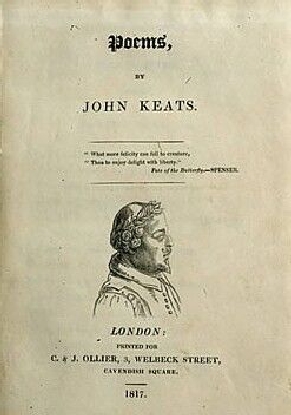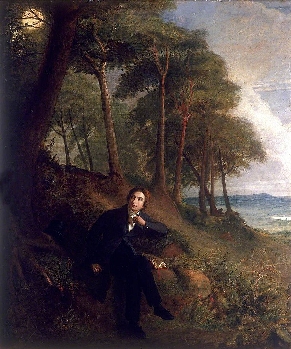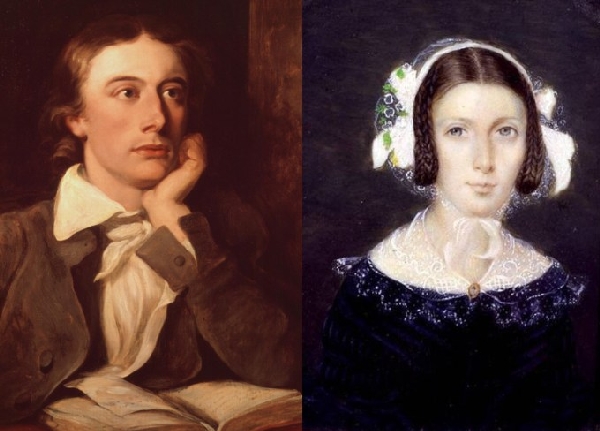Numbers 278/84: Keats' 200th Festival ......
John Keats has been and remains universally admired and frequently quoted but not until after he died of tuberculosis at the youngest of ages, just 25. His father was a livery stable-keeper who was killed after being trampled by a horse which had a profound effect on shaping Keats' understanding of the human condition. He was brought up by his maternal grandmother and at 15 left school studying medicine at a London hospital and becoming a licensed apothecary. But that career never took off; even as he studied medicine his devotion to literature and the arts never ceased and by good fortune he met publisher Leigh Hunt of The Examiner. Hunt's radicalism and biting pen had landed him in prison for libelling Prince Regent but he had an eye for talent and was an early supporter of Keats introducing him to the world of politics. In his honour Keats wrote the sonnet Written on the Day that Mr. Leigh Hunt Left Prison. Hunt also introduced the young poet to Percy Bysshe Shelley and William Wordsworth. In 1817 Poems, by John Keats appeared and the following year he published Endymion, a mammoth four-thousand line poem based on the Greek myth. But this daring and bold style earned him nothing but criticism from England's revered publications Blackwood's and the Quarterly Review. How much of an effect this criticism had on Keats is uncertain but he did take note. He had already moved beyond Endymion even before it was published and by the end of 1817 he was re-examining poetry's role in society. In lengthy letters to friends Keats outlined his vision of a poetry that drew its beauty from real world human experience rather than some mythical grandeur. He was formulating the thinking behind what was to become his doctrine of Negative Capability - the idea that humans are capable of transcending intellectual or social constraints and can far exceed creatively or intellectually what human nature is thought to allow. Keats saw a world more chaotic, more creative than what he felt others would permit.
Keats as a Mature Poet. In summer 1818 Keats took a walking tour in Northern England and Scotland. On his return he cared for his brother who was dying of tuberculosis he met and fell in love with Fanny Brawne [pictured with him at end] and continued to write prolifically including his first Shakespearean sonnet When I have fears that I may cease to be. His work at this time also included the beautiful To Autumn, a sensuous work published in 1820. This poem and others such as To a Nightingale [1819] demonstrated Keats unique style, one that was filled with more sensualities than any contemporary Romantic poetry. The painting below by friend Joseph Severn illustrates that fine poem ….
My heart aches, and a drowsy numbness pains / My sense, as though of hemlock I had drunk,/ Or emptied some dull opiate to the drains / One minute past, and Lethe-wards had sunk:/ 'Tis not through envy of thy happy lot,/ But being too happy in thine happiness,— / That thou, light-winged Dryad of the trees,/ In some melodious plot / Of beechen green, and shadows numberless, / Singest of summer in full-throated ease ……
 
In 1819, like his brother, Keats contracted tuberculosis and his health deteriorated quickly. Soon after his last volume of poetry was published he ventured to Italy with his close friend, the painter Joseph Severn, on the advice of his doctor. The trip also marked the end of his romance with Fanny Brawne, his health issues and his own dreams of becoming a successful writer having sadly stifled their chances of ever getting married. He arrived in Rome in November and the last few months of his life proved particularly painful and he died on even date 1821.
To Autumn
Season of mists and mellow fruitfulness,
Close bosom-friend of the maturing sun;
Conspiring with him how to load and bless
With fruit the vines that round the thatch-eves run;
To bend with apples the moss'd cottage-trees,
And fill all fruit with ripeness to the core;
To swell the gourd, and plump the hazel shells
With a sweet kernel; to set budding more,
And still more, later flowers for the bees,
Until they think warm days will never cease,
For summer has o'er-brimm'd their clammy cells.
Who hath not seen thee oft amid thy store?
Sometimes whoever seeks abroad may find
Thee sitting careless on a granary floor,
Thy hair soft-lifted by the winnowing wind;
Or on a half-reap'd furrow sound asleep,
Drowsed with the fume of poppies, while thy hook
Spares the next swath and all its twined flowers:
And sometimes like a gleaner thou dost keep
Steady thy laden head across a brook;
Or by a cider-press, with patient look,
Thou watchest the last oozings, hours by hours.
Where are the songs of Spring? Ay, where are they?
Think not of them, thou hast thy music too,--
While barred clouds bloom the soft-dying day,
And touch the stubble-plains with rosy hue;
Then in a wailful choir the small gnats mourn
Among the river sallows, borne aloft
Or sinking as the light wind lives or dies;
And full-grown lambs loud bleat from hilly bourn;
Hedge-crickets sing; and now with treble soft
The redbreast whistles from a garden-croft,
And gathering swallows twitter in the skies.

Monocultural opined Avril on review. My La Paz call for boxed matches and today I've been striking the Kempinski Hotel Liberador in Buenos Aires; in the stack are myriad memories - Penang's E&O, King's Casino in Great Yarmouth, University Park Hotel Gold Coast Qld., Shangri La KL, Cliveden, Eaton Hotel Kowloon, The Howard London … need I say more?
Published Date: February 23rd 2021
|





